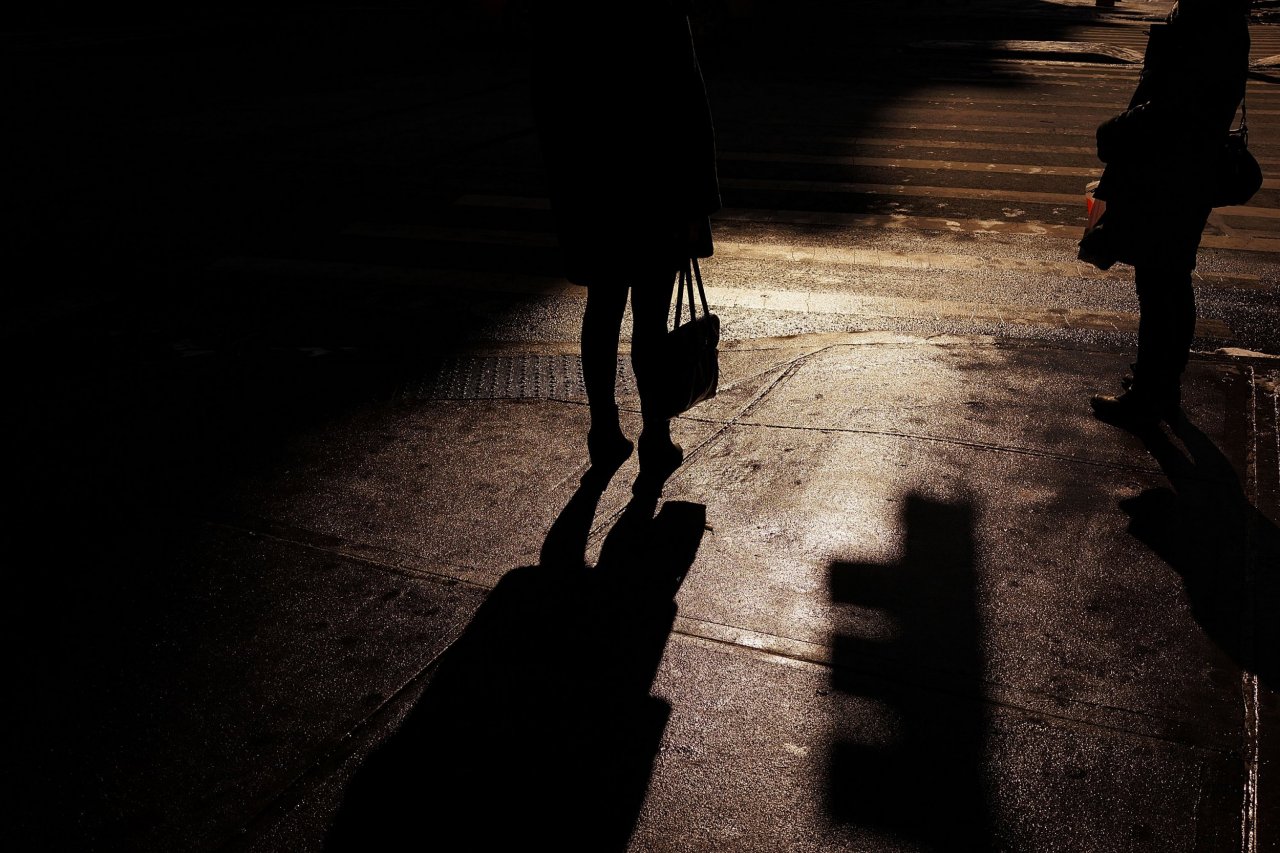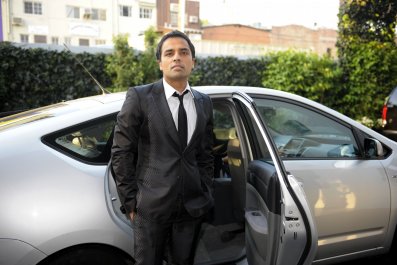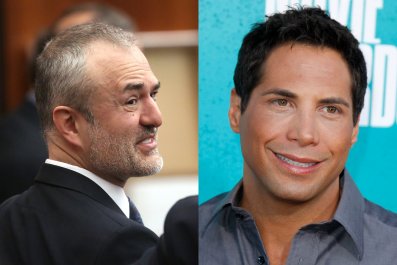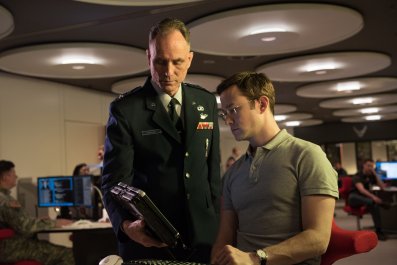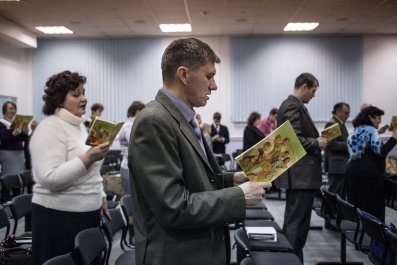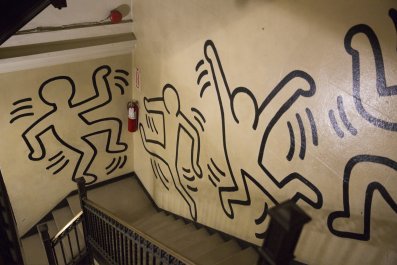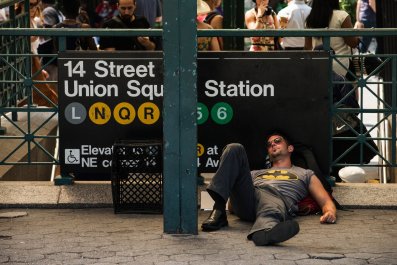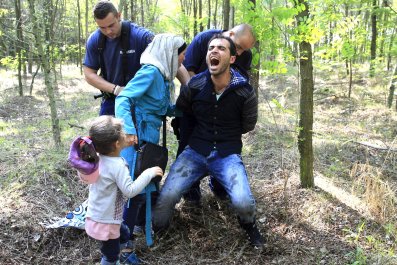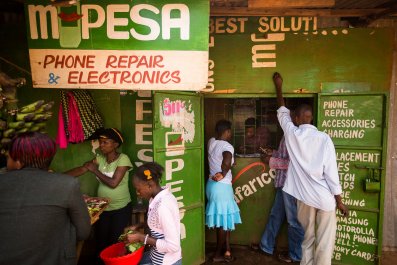"My first son was my 1993 World Trade Center bombing baby," says Gina Bennett, a veteran CIA analyst who has spent her career tracking down the perpetrators behind some of the worst international crises in recent memory. Bennett, a divorced mother of five, can match the birthdate of each child by the bad guys she was pursuing at the time. She calls her second son her "Khobar Towers baby" (born shortly after the 1996 bombing of a military housing complex in Saudi Arabia); her third child, a daughter, her "African embassy bombing baby" (she arrived a few weeks before the 1998 bombings of the U.S. embassies in Kenya and Tanzania); and her fourth, another son, her "9/11 baby."
Bennett was in the early stages of her pregnancy during that attack, and despite all of her morning sickness, "most people didn't know I was pregnant," she says. Her fifth child, a girl, was her "Fallujah baby."
We're sitting in the CIA's Office of Public Affairs, surrounded by framed posters of blockbuster thrillers like Clear and Present Danger, Patriot Games and Spy Games. Ever since British secret agent James Bond appeared on film in the 1960s, Americans have been entranced by covert spies leaping onto moving trains moments after bedding exotic babes, or military-grade muscle men slicing through society's criminal underbelly with the latest guns and gadgets.
We don't picture Bennett: a woman, a mom.
Bennett wrote the first report warning of Osama bin Laden in the early 1990s, years before 9/11, and she was one of the six women in the CIA's "band of sisters" that tracked down bin Laden and inspired the 2012 thriller Zero Dark Thirty. She briefed Secretary of State Condoleezza Rice while in labor and has brought newborns to the office so she could lend her expertise during crises. (After the Africa embassy bombings, Bennett's boss, who loved babies, whisked away her 3-week-old daughter for hours while Bennett typed up a cable. It wasn't until weeks later that she learned her daughter had been in the CIA director's office for a meeting about President Bill Clinton's order for a retaliatory bombing raid on Afghanistan.)
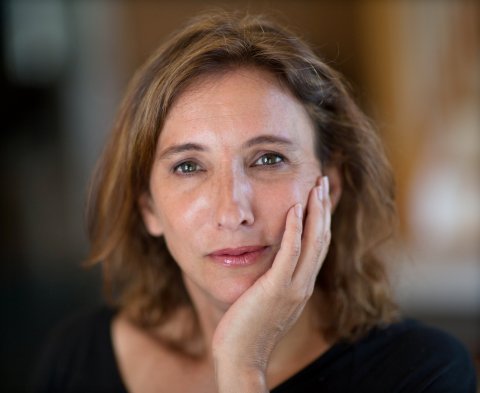
Women have been central to American spycraft since 1776, and they continued to play important roles in the World War II–era Office of Strategic Services (OSS), the CIA's predecessor. Even so, the agency has a long history as a chauvinistic old boys' club rife with sexism. "People treat it as only men have a calling to serve their country and it's unnatural for women to do it," Bennett says. "Women have been extremely involved and integral! It burns me up to no end. Women in intelligence is not new. We've always been important, and there's nothing strange with us wanting to do this role."
Hollywood hasn't prepared us for women like Bennett—or, say, Maja Lehnus, the CIA's deputy chief financial officer, who's been married for 29 years, has two children and was the first woman to hold six different leadership positions at the agency, including serving as the first female chief of the center responsible for combating the spread of chemical, biological and nuclear weapons.
"I lived in a world where every day we talked about incredibly nasty foreign weapons developments," Lehnus says. "There's reason to be afraid. There's reason to be afraid all the time!" She laughs. "People would say, 'What keeps you up at night?' And I'd say, 'I've got a list of nine, and I rotate through them,' because there were just so many bad things that could happen, whether it's a loose nuclear weapon or North Korea deciding they are gonna lob one over…. So I say, 'My job is to worry for you.'" She laughs again. "It's a bad world. We've got bad things going on out there."
At a time when the country may be just weeks away from electing its first female president, many Americans still have no concept of who's keeping them safe—and that women play a critical role in that effort. Some may think CIA women were confined to the counterterrorism unit that pursued Osama bin Laden, which gained extraordinary attention after his death. In fact, women are operating at unprecedented levels on every floor of CIA headquarters and throughout its far-flung global outposts. Perhaps hoping to combat this misconception, the CIA granted Newsweek access to seven women from all parts of the agency, including a clandestine operations officer, a bombing expert and a weapons and space analyst. A handful of them are undercover and cannot share their names because of the sensitivity of their work (their names appear here in quotes). Some are married and have children. Two are single mothers. One was the first CIA officer to come out as gay and not get fired for it. And if you found yourself sitting across from any of them on the New York City subway, she'd look more like a tourist from the Midwest than a master spy.
Despite their extraordinary accomplishments, these women have faced double standards and sexism, and for some, success has come at great personal cost. As former covert CIA Operations Officer Valerie Plame says of many women she worked with, "They were smart and ambitious and funny, but to be very honest, they had stepchildren. They had not raised their own children. Or they were divorced. Or they went home to cats. They had really paid a personal price."
"The work can break you," says "Vivian," a scientist and explosives expert. "It is 24/7. It is always at a high pace, and if you don't step outside of it every once in a while, it will eat you alive."
'Chief of Station of Nobody'
Hollywood has convinced us all that women in the CIA belong to a sorority of badass bitches who stab by day and seduce by night. From Homeland 's Carrie Mathison to State of Affairs 's Charleston Tucker, we have become so accustomed to this repository of interchangeable female CIA screwups and honeypots, and their unstable, erratic behavior, that we forget that the job involves saving lives and preventing atrocities, and you must be able to compartmentalize your emotions at precisely the most horrifying moments. Thanks to Hollywood's clichés, the American public has been largely kept in the dark about Virginia Hall, who joined the OSS in 1944, organized sabotage operations across France, mapped drop zones, and helped POWs to safety—all while disguised as an elderly female farmhand and with a prosthetic leg she named Cuthbert. The Gestapo considered her "the most dangerous of all Allied spies."
"It was easier to be a woman in the OSS than in the CIA in the early days," says Toni Hiley, the CIA Museum director. Eloise Page was one of 4,500 women who served in the OSS. She began her career as the secretary to General William Donovan, head of the OSS, and ended it as the third-highest ranking officer in the CIA's Directorate of Operations, the home to case officers who carry out covert assignments and recruit spies. Page, who was known among some colleagues as "the Iron Butterfly," also became the first female station chief, the highest-ranking job for case officers abroad, and the first woman to head a major intelligence community committee. Before Julia Child introduced American families to French cuisine, she, too, worked for General Donovan and the OSS.
"In the early days, it was benign neglect. There were more men than women. They didn't even think about [us]," says former clandestine officer Suzanne Matthews, who joined the CIA in 1975 as a secretary. When she entered the operations training course, the precursor to becoming a case officer, she was one of "three or four" women in her class. "Some of the instructors down there misbehaved and made sexual advances to the students—and they were rebuffed, of course—but the students were just trying to get through this very intense program," she says.
"They tried to push all the women into becoming analysts. Or reports officers. That was acceptable," says Janine Brookner, who joined the CIA in 1968. "I insisted on going into operations." She says she was one of six women in her 66-person officer training program. When she landed her first job as a case officer in Asia, her station chief saddled her with "ridiculous" paperwork and assignments. "In the meantime, I went out and met people. I used my training and background. By the time my next chief of station got there, I knew people from the presidential palace all the way to the Communist Party. I was in my 20s—this little blond woman. No one ever suspected who I worked for," she says.
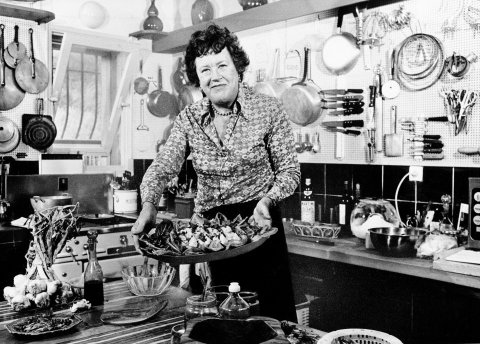
When a new boss came on board, Brookner wrote a memo summarizing her contacts and their access to information. He was impressed. "He was one of the few men in the agency in those days where it didn't matter whether you were a man or a woman; if you could do the job, he would use you. He gave me my opportunity. Not only did I do well there but he made sure everybody at headquarters knew about me."
Brookner once made a deal with a division chief: She'd work in his station for a couple of years, and if she did well, he'd make her a station chief. When it came time for that promotion, he offered her one of two undesirable positions in Latin America, where she'd have no chance of being promoted and no operations to oversee. "I'd be chief of station of nobody! I said to him, 'What will I do there?' He said, 'You could go shopping.'"
Brookner ended up accepting a station chief position that "none of the guys wanted...because of the dangers and problems in the station and in that country. But it was the only one I could get, and at least we had operations and a staff." (While she cannot say where she was posted, The New York Times reported that she was the station chief in Jamaica. It was "the CIA station from hell," according to the Los Angeles Times. "Jamaica had a notorious reputation as the agency's dumping ground, a dead-end post for misfits and losers." )
Another time, Brookner was close to recruiting a critical target she'd been developing for six months when her station chief was removed. The new chief arrived and wanted someone else to recruit the target. "When that happens, you don't lose your cool. You say, 'Let me think about it.' Then you come back in calmly and say, 'I thought about it, and this is why I think I should make the recruitment.' He was still reluctant, but when I did it, I succeeded—and it made him look good," she says. "Over the years, almost all the time, especially as a woman, you had to start at square one again and prove yourself. There were very few of us who succeeded."
Yet Brookner did succeed—she infiltrated the Communist Party, recruited a Soviet bloc agent and became one of the CIA's first female station chiefs—until subordinate officers (including her deputy chief of station, whom she had reported for abusing his wife) accused her of being a lush who sexually harassed men and wore provocative clothing. It was 1992, and Brookner was, at that point, a 24-year veteran of the clandestine service. She vehemently denied their claims, sued the CIA and won. In December 1994, the agency settled for $410,000. Brookner resigned soon after. Today, she's a lawyer in Washington, D.C., specializing in cases against the CIA and other federal agencies.
As women continued to fight for more opportunities in the 1990s and 2000s, legal troubles plagued the CIA. In 1995, it paid $1 million in a class-action case accusing the CIA of blanket sexual discrimination. In 2007, a group of women filed a class action alleging that female officers were punished more severely than their male colleagues for having affairs with foreigners. Brookner brought the case to the Equal Employment Opportunity Commission, but a judge dismissed it for not having enough women in the class, so she filed individual cases for the women and won settlements for each of them.
Today, women make up 45 percent of the CIA workforce and 34 percent of senior leadership. Between 1980 and 2012, female representation increased from 9 percent to 44 percent of midlevel to upper-midlevel positions, like team chiefs or deputy team chiefs, according to a 2013 report led by former Secretary of State Madeleine Albright. But in 2012, just 19 percent of agency officers promoted to executive-level jobs in the Senior Intelligence Service (SIS) were women, down from around 30 percent in previous years. The report sounded the alarm for "significant reforms" and said that "not maximizing women's talents and expertise directly and negatively impacts the mission."
Since 2013, the agency says, it has "produced tangible progress." In the past three years, for example, there's been "a minor increase in the percentage of women" who take key leadership courses critical to being promoted to the SIS. Women also hold the No. 3 and No. 4 positions at the CIA: Meroe Park is the executive director, and Carmen Middleton is the deputy executive director. In 2013, Avril Haines became the first female deputy director; she's now deputy national security adviser to the White House.
Still, problems persist. A woman has yet to hold the agency's most prestigious job, head of the Directorate of Operations. Women are more likely than men to decline high-profile assignments—which are critical to advancement—because they require long, unpredictable hours. "I have about seven years out of my career when I could not take certain assignments that were high-profile, incredibly demanding and involved travel," Bennett says. "So naturally, when you look at my depth and breadth of experiences compared to a man of my rank and age, you will see a disparity. You won't see any points for the skills I gained being the mother of five."
She also rattles off anecdotes about female colleagues who've been told they talk too much, or have sharp elbows, or are too pushy or too emotional. Once, a colleague was told she needed to show more executive presence and should stop dominating meetings. "You can act like a man, but you'll be judged like a woman," Bennett says. "If you act like a woman and try to get into executive leadership, you're shamed. Every woman here believes they're being measured by behaviors of professionalism defined by white men decades ago.
"I'm so sick of the deputization of women. Deputy is the worst thing you can be. You're carrying out the vision of someone else. It's not a glass ceiling; it's a wall."
The First to Die
The CIA's visitor center looks more like the waiting room for a car wash than the portal to America's foreign intelligence service: gray chairs, fluorescent lights, a TV hanging in the corner, the Today show on mute. A man sitting behind a large glass wall slowly issues guest passes. I hand him my driver's license and take a seat next to a stack of hunting magazines. Outside, three men in dark suits linger on the sidewalk, talking. I pick up a copy of Outdoor Life's Meat Issue and wait.
After I'd read more than I'd planned to about hunting, butchering, freezing and feasting on often adorable forest creatures, the man behind the glass wall finally calls my name, hands me a guest pass and returns my ID. Why had it taken so long? Was he doing a background check? Kali Caldwell, my main contact from the CIA's Office of Public Affairs, says the agency doesn't do that kind of thing. "I wish I could tell you I knew what elementary school you went to, but I don't," she says, adding that she did "a little research" on my writing, mainly to confirm I wasn't a conspiracy theorist.
I then drive into the belly of the CIA's 258-acre campus, passing joggers, leafy vistas and seemingly endless stretches of parked cars. If Hollywood gets one thing right, it's the awesomeness of this place. In the lobby of the Original Headquarters Building, the CIA's famous granite seal is emblazoned on the floor, 16 feet in diameter, with an eagle, shield and 16-point compass star surrounded by the words "Central Intelligence Agency United States of America." Off to the left, there's the OSS Memorial, a single star honoring officers who died in World War II. And on the right, Memorial Wall, where 117 stars are carved into marble, honoring agency officers who've died in the field. An American flag hangs on one side, the CIA flag on the other.
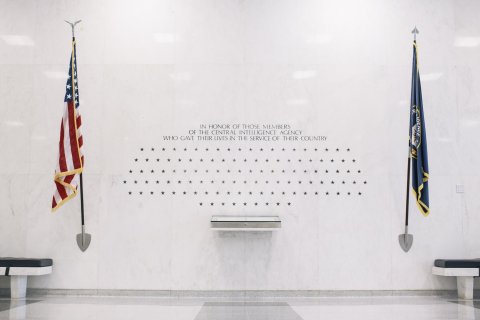
I stand there committing the scene to memory (iPhones and cameras are not allowed in here) when I suddenly realize that a handful of very official-looking men are walking straight for me. Was I in the wrong place? I riffle through my purse, looking for my guest pass, when I hear a woman's voice calling my name. I look up. The men are getting closer, but there's that voice again. A woman emerges from the left. I wave. The men retreat. She introduces herself as Toni Hiley, the museum director, then ushers me over to the Memorial Wall.
"Where you are standing now is where every new agency officer, on that first Monday of their career, swears the oath to serve our nation," she says. She points at the 117 stars and explains that only 11 are for women. One honors Barbara Robbins, who joined the agency in July 1963 as a secretary-stenographer and was killed two years later when terrorists bombed the U.S. Embassy in South Vietnam. She was the first female CIA officer to be killed in the line of duty, and, at 21, she remains the youngest. Another star is for Monique Lewis, who was just hours into her first day as a CIA officer when a suicide bomber attacked the U.S. Embassy in Beirut in 1983. Her husband, James Lewis, a paramilitary officer there, was also killed.
Another star honors Jennifer Matthews, a top Al-Qaeda expert who was killed in 2009 when a Jordanian double agent blew himself up at a CIA base in Khost, Afghanistan. The deadly incident, which took the lives of six other CIA officers, ignited a debate over Matthews's field experience, her role in the tragedy (she'd been the base chief) and the fact that she had a family. "Being a mom and a wife really has nothing to do with it," says Suzanne Matthews (no relation to Jennifer). "There are lots of moms serving in areas like that. Nowadays, if you expect a promotion, you have to serve in war zones, whether you're a man or a woman."
" There were a lot of people criticizing her for being there because she had three kids at home, but no one criticized the men," Bennett says. "It was such a low point for us. We realized people still thought that way, even in our organization!"
'Nice Try, Abby, But...'
There's a sexy myth about how people join the CIA: mysterious phone calls, taps on the shoulder, strangers telling you they've been watching you for years. And then there's reality.
"Abby" saw a sign posted on campus during graduate school. "It said, 'The agency is here to interview. Please drop your résumés in this packet.' Right next to it was a sign that said, 'Department of State is here to interview. Drop your résumés in this packet.' And so on and so forth," she says. "It's easier to tell the 'tap on the shoulder' story. It's a bit more sensationalistic."
Abby, Caldwell and I are sitting at a long, rectangular table in a nondescript conference room while a couple of more women sit in chairs against the wall, listening and taking notes. After each interview, one of them collects my recorder, dumps out the batteries and stores all the parts in a ziplock bag, which she returns to me before the next interview.
"I was born in South Asia," Abby says tentatively, ghost-doodling circles on a white legal pad with an unopened pen. "I grew up overseas." She's nervous, and Caldwell explains that she should be: Abby is the first first-generation, naturalized female case officer from a certain South Asian country to join the CIA. She's also a Muslim-American, and her work takes her to what Caldwell calls "the tip of the spear" in America's fight against terrorism.
"I agreed to do this [interview]—" Abby stops short. "You should know this: Really, case officers do not speak to the press. There aren't that many like me here. It would be very easy to identify me if I gave you enough, even minor details."
Here's what she can say: After attending "high-performing, rigorous" high schools, she arrived in the U.S. with two suitcases, $400 and an acceptance letter to college. Eventually, she moved to New York City to work in women's rights. In 2000, four years after being naturalized, she joined the CIA. "There's the opportunity. I reach for it. I did it. Now I'm in, and now it's catching up to me. I can't talk about it! I can't tell anyone! My family—these are the people who are, like, 'Go do something benign, and then we'll support you!'"
Abby went straight into the CIA's secretive operational-training program, which we've come to know as the Farm (a nickname the agency is still reluctant to acknowledge). Abby is reticent to share details. It's "quite a few months" long, has a high failure rate…and very few women. "What I felt in the first few days [after joining the CIA] was fear. I was just scared out of my mind. If I was scared before, the Farm was a whole different level of 'Oh shit, what have I gotten myself into?'"
The Farm isn't the only subject that's off-limits. Vivian, the explosives expert, can't describe her work in any detail: "Nope. Sorry." Asked to explain what she does as a nuclear expert, "Julie" ends a rambling minute-long explanation with "I'm not doing a good job of explaining this." (She was right.) Asked if she travels for work, she replies, "Different people travel differently," then laughs at the absurdity of her answer. There comes a point when so many of the women have described their work as putting together a 1,000-piece jigsaw puzzle with only 200 of the pieces that Caldwell pipes up and says, "We don't coordinate [our answers]!"
As a case officer, Abby wasn't solving puzzles; she was recruiting spies. "Dozens" of them. "It is everything that's in the movies," she says. "We're meeting with people who are giving us information that would definitely get them jailed or killed or their families tortured. And I hope I've demonstrated that I'm not being dramatic. This is real…. You are on a dark street corner. You are passing something in the middle of the night or in a crowded train station. All those things are true, but it's not a guy who's doing them; it's me. But behind me back at headquarters is a whole bunch of people looking to see how I did it...and a whole bunch of guys ready to go do the same thing!" She laughs. "So if I didn't do it correctly, it's 'Hey, Abby, nice try, but we're gonna send John.'"
Yet Abby did excel, so much so that she's now a senior manager overseeing a team tackling the Islamic State group (ISIS) and other militants in the Middle East. She also works on one of the most critical issues for the White House and policymakers (she can't say which one). "My friends, average New Yorkers, I think even they can't fathom that I would have the amount of responsibility I do here," she says.
Caldwell explains that most people from South Asian backgrounds are recruited to the CIA as linguists or support officers. "That's about as far as they go," she says.
"Being a linguist is incredibly critical, but you wouldn't be a manager in cutting-edge policy. You're swimming in the deep end there," Abby says. "That's the big deal. If I was doing all of this in Silicon Valley, they'd be writing this up like crazy: 'Oh my God, look at what she's achieved!'"
Abby's success has come with a cost: She's single. "My male colleagues are all married. They have kids. Interestingly, it's only the single women who are here until 9 p.m. Do we carry more of the water? Sure. Are we willing to do it? Yes. Are we complaining about it? No. Because God, it's delicious!"
Case officers face a unique set of problems when it comes to dating and raising children. They often live overseas, move to a new city (or country) every few years and have a cover identity to protect. The work really isn't family-friendly, and there's little time for a personal life. "Typically, you do a cover job all day, then you're out doing CIA work all night. Not great if your baby sitter cancels," Plame says. "When I left [the CIA] in 2007, I still found it very hard to find a female mentor who had achieved great ops success who also had something resembling a family life. That was very telling, right? You want to find someone that you feel like, 'I can emulate this career. I can do this.' I found it impossible."
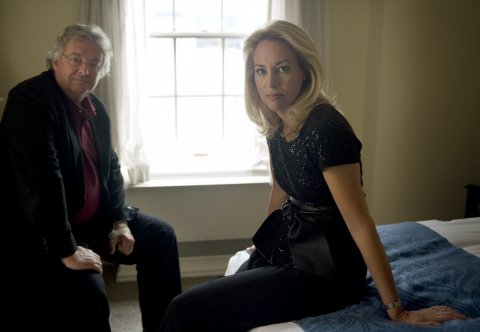
Abby says her female agency friends are financially independent, drive "the best cars" and have "amazing homes" decorated with "the best stuff from around the world. We have really succeeded. But what do you do when you retire? You're by yourself. It takes a bit to process that."
'On a Terrorist Hit List'
One of the worst experiences that Lehnus, the CIA's deputy CFO, ever had with sexism at the agency was when a supervisor implied she'd received high marks at her review because she'd been sleeping with her boss. "I sat there in stunned silence," Lehnus recalls. "I didn't react at all. I wasn't equipped to deal with it." She was a student at Virginia Tech at the time, studying electrical engineering while analyzing foreign weapons at the CIA. She was also the only female analyst in her group, and male colleagues routinely slung crude, inappropriate comments at her.
Since then, Lehnus has claimed the "first woman to…" title six times and received the National Intelligence Distinguished Service Medal, all while raising two kids and becoming that rare symbol of success for younger female officers looking for proof that they don't have to sacrifice family for work.
In her early days, during a yearlong women's executive leadership program, Lehnus had the chance to interview all of the senior women in the directorate. "There weren't that many, and it didn't take me that long," she recalls. "What I took away was, most of 'em were single and a few were married, but none had children. So that was really depressing."
Lehnus and her husband, an electrical engineer, have two kids—a daughter, who's a nurse, and a son in college. Growing up, they knew that Mom worked for the CIA. She took them to the agency's family days and, when her son started playing Call of Duty, she introduced him to her unmanned aerial vehicle team. Once, he came home "talking a mile a minute" about an IMAX movie he saw about a moon launch. "I said, 'Mom used to run the missile and space group!' Suddenly, there was a new appreciation."
But it was hard juggling work and family, Lehnus says. She was shuffling young kids to and from day care, staying on top of activities, grocery shopping and taking calls in the middle of the night on a secure line the CIA had set up at her house to discuss nuclear tests. She even fielded calls from her hospital bed, right after giving birth to her daughter.
How female CIA officers navigate this muddy terrain depends on their jobs, their personalities and their support systems at home. "I've hauled breast pumps to more countries than I care to admit and gotten milk back from places that I don't think people thought you could get milk back from," Vivian says. "I love what I do, but I love my children more…. I could have every accolade from here, and if it's not working at home, it's not worth it, to me."
Suzanne Matthews and her husband, Jason, were a "tandem couple" (CIA-speak for married spies), and they raised their children overseas, moving to a new city every two or three years. It's easy to tout the benefits of raising kids abroad: They grow up understanding different cultures and are exposed to a wider, more fascinating world. But Suzanne admits that their work could be terrifying. "We've been in places where my husband was on a terrorist hit list and had to drive an armored car," she says. A guard stationed outside their apartment "would walk around the car with one of those mirrors on a stick looking for bombs," she says. There were a lot of strays in the area, and when her children asked what the guard was doing, she told them he was "looking for cats who might have climbed under the car to sleep at night, so we wouldn't run them over."
In the late 1990s, Suzanne and Jason were stationed in an unstable Balkan country (she can't say which one). "We evacuated three times. I had to drive all the spouses five hours away. We did home-school in hotels and tried to keep the kids calm while we're just freaking out. Jason was the chief. It was a very stressful time."
When Lehnus became a second-level manager overseeing a "pretty large group. It was just too much," she says. Her husband scaled back his career to help out at home. "Not everyone has that," she says. "My husband is not threatened by my job. He always felt that my jobs here were important, and he was going to support me."
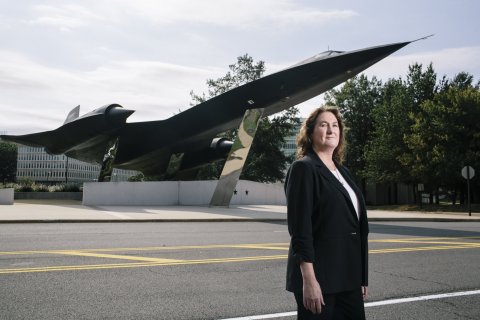
One of their greatest hurdles came when their young daughter was diagnosed with Type 1 diabetes. "I'm running a large organization at that point, and suddenly we had all these doctor appointments." Lehnus didn't miss one, not even when she was asked at the last minute to brief a new director about the "Iraq WMD Lessons Learned" report. (She sent a senior analyst instead.) To comply with a policy at her daughter's school, she and her husband also became permanent fixtures on field trips. "You've got this large number of people working for you, and they're saying, 'OK, tomorrow we have to do this and this.' I'm like, 'Oh, sorry! Going to the zoo!'"
Our Gay Spies
"Sarah" knows about being one of the "onlys" at the CIA: She's a single mother and a black woman working in a largely male-dominated field—she's a weapons and space analyst, responsible for the technical side of what bad guys stash in their arsenals. In h er first year at the CIA, a colleague started "ranting and raving" about the futility of having a day off for Martin Luther King Day, arguing that "there are other holidays that are far more important," she says. "I told him that his comment made me wonder whether he really wants me sitting next to him, because without the likes of Martin Luther King there would be no me sitting next to him. I would have remained a slave…. He was so quiet. He came back the next day and apologized."
Arguing for diversity in the CIA is ludicrous, verging on insulting. The CIA is a global organization, responsible for national security; how do you achieve a global perspective if you're all white men? "You really do need diversity of thought. You don't get that if you're hiring people who look like you, think like you, talk like you, walk like you—if you're only willing to promote your buddy—that's not gonna help anybody," says Sarah. "You can't secure this nation with one demographic."
The CIA admits it has a diversity problem. Since 2008, the percentage of minorities hired has fallen, according to the 2013 Diversity in Leadership Study. While racial and ethnic minorities account for 24 percent of the agency's workforce, they make up just 11 percent of senior executives. And after an increase in African-American officers reaching the highest rungs of the organization between 1984 and 2004, that progress has reversed in the past decade. Earlier this month, CIA Director John Brennan acknowledged this issue when he told students and dignitaries at Birmingham City Schools' Central Office that "I don't want the agency to be full of individuals who look like me, talk like me, who have similar backgrounds and experiences. I do think if you all are looking the same and acting the same you tend to have a 'group-think' which does not help us understand all the complexities of this world."
Before Lehnus became the deputy CFO, she was chief of the Diversity and Inclusion Office. "I gotta say, that was a really hard job. I said, somewhat jokingly—but not really—that protecting America from weapons of mass destruction was easier than leading diversity and inclusion."
Over the past decade, Sarah has seen positive change, as well as frustrating setbacks . "You have someone come in, and they'll be a champion for diversity. Then once that director leaves, you'll see another shift, which typically goes back to the way things were," she says. "I honestly believe it was better when I first started, in terms of diversity…. There are still leaders who think white males should be leading the organization."
Tracey Ballard, a technical analyst who joined the agency over 30 years ago, calls herself "the first vocal, visible, cleared person" to come out at the CIA. She was raised by her single mother in Bladensburg, Maryland, and joined the agency as a young, single mother herself. It was the mid-1980s, when being gay was considered a threat to national security. "We all knew you could be weeded out if you happened to be LGBT," Ballard says. She quickly learned to live a double undercover life, not talking about work at home and hiding her true self at work.
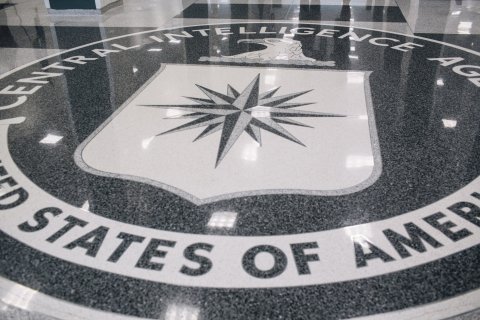
By the time her daughter turned 5, she couldn't keep up the lie any longer. "I was raising a girl in a society that already had limitations on young ladies," she says. "It was important for me to be myself and stand up for myself so I could teach her to do the same thing."
Ballard came out during a routine polygraph test and spent the next year and a half under investigation. Colleagues, including those who were gay, ostracized her. It was the most stressful time of her career. She considered leaving, but "the more pushback I got, the more I realized it had to happen from here, and I needed to stay."
Ultimately, Ballard wasn't stripped of her security clearance, and she didn't lose her job. "Later I learned almost everybody who'd [come out] prior to me had been dismissed from the organization."
Ballard, who married her longtime partner two years ago, has become a pioneer for LGBT issues at the agency. In 1996, she helped found the CIA's Agency Network of Gay and Lesbian Employees, or ANGLE. Three years later, the agency held its first pride month event. In 2012, two years after President Barack Obama repealed "don't ask, don't tell," the CIA held the first-ever intelligence community LGBT summit. "When I [joined the CIA], basically LGBT were not welcome," Ballard says. "We have done a 180. We do outreach into the LGBT community. We have a director who's extremely vocal in his support, not just of LGBT but all minorities and people. We have allies at every level of our organization…. We are becoming a more inclusive organization."
Mom's a Badass
Bennett and I are eating lunch in the CIA's dining room—a bright room with tall windows, floral tablecloths and white linen napkins folded like hats—when she says, "I want to tell you a story I haven't told yet." It's an intriguing tease from a woman who's been interviewed by many news outlets, including The New York Times , Makers and the 2015 documentary The Spymasters: CIA in the Crosshairs.
"A couple days after 9/11, Cofer [Black, then-chief of the Counterterrorism Center ] brought us into the main CTC vault. This was just after approval for the war plan and the strategy for the agency's role in the overall U.S. response to 9/11. Cofer said, 'We're going to war, and we're gonna do our part our way,'" Bennett recalls.
"I remember looking around the room. Everyone was looking at Cofer, but inside, we all knew what he meant. Who knew better than us? We'd been there for over a decade fighting Al-Qaeda already. Al-Qaeda was new for the rest of the government and America, but not for us. We knew to go to war with a terrorist network was not a conventional war. These were terrorists who use their wives and children as human shields. We knew the costs....
"Cofer said, 'Take a good look around this room. When we're done, some of us aren't gonna be here.' We all knew what he meant, and no one looked around."
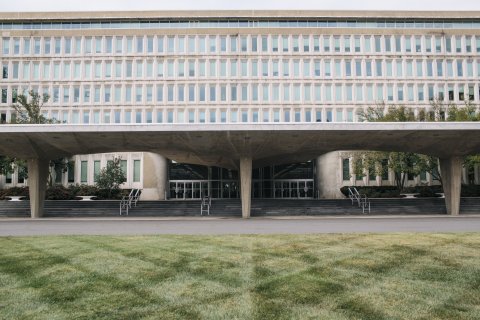
Bennett glances up, tears in her eyes. It's a rare emotional moment for a woman who boasts that she's become a master of apathy. The CIA stereotype is that operatives (Abby) are badass Jason Bourne types and that analysts (Bennett) are nerdy brainiacs, the ones sitting in front of computers calling paper cuts their war wounds. Yet the real cost of being an analyst is invisible.
"I've always felt very strongly that the toll taken on analysts comes from our need to be stoic and objective and unemotional in our analysis. That requires you, in situations that are very emotional, to shut emotion down, so that you are able to think very clearly," Bennett says later. "You do it not just within these walls but within—" She stops talking. When she begins again, her voice cracks. "Within all of your relationships. I'm kind of experiencing that right now. Just within the last week, the love of my life is moving out, and this is part of it, because I don't allow myself to feel when the feeling is most strong, because that's precisely when I need to shut it down the most.
"When there's 3,000 dead and everyone else in the world is freaking out, and you have to figure out how to stop the next attack coming in the next hour, you can't afford to be emotional. Right when a human being should be most passionate, you cut it off. You do it for as many years as I have, it becomes more than habit. It's just default, and that's not healthy."
In moments of crisis, Bennett says, she knows how to "exist outside" herself. She feels cool. Calm. She's unemotional and objective. Her work at the CIA may have demanded this skill, but she didn't learn it there; it's something she developed out of necessity—something that's been ingrained in her since childhood, when she says she endured years of sexual abuse.
This kind of reaction is not uncommon among people who've survived early-childhood trauma, and Bennett harnessed her survival instincts and applied them heroically at the CIA. "From Pan Am 103, to the first World Trade Center bombing, to the [Khobar Towers] bombing in Saudi Arabia, to the African embassy bombing, to 9/11 and every single thing before and after, I had this ability to shut off fears, feeling and emotion and just stay very clearheaded. I always thought that was a great strength.
"What I didn't realize was that I was reinforcing old coping mechanisms for trauma that also created a wall in being able to feel in any environment: with my children, my ex-husband, my boyfriend, my friends," Bennett says. "My colleagues and I know fully that sacrificing our life might be the ultimate price we pay but didn't really pay attention to how we sacrifice our living—by suppressing emotion. We may stay alive in the end, but [it's] potentially an empty life…. I don't think the American people nor the agency ever expected that kind of sacrifice of me."
Bennett's kids didn't either. Her voice softens as she describes her children admitting to her that she sometimes comes across as "cold and uncaring," or emotionally unavailable. "Imagine how your children feel when they feel like nothing they do—or don't do—affects their mother?"
Bennett never worked undercover, so she didn't have to lie to her kids about her job. Their general understanding was this: Mommy works on the computer and helps the police find bad guys . Still, she treads carefully. When one of her sons was 3 and a half, she was working in terrorism at the State Department. One weekend, she had to bring him to work. "I'm in this windowless vault with all these wanted posters and pictures of terrorist attacks. I had him playing with crayons. I was working on the computer. At one point, I had to take him to the bathroom, and we're walking through the cubicle farm, and he says, 'Why is that guy holding that gun to that woman's head?' It was a photo of a hostage. I walk by that every day and hadn't thought about it. It hadn't occurred to me the impact of that image on my son."
When her eldest son graduated from high school, she made him an online photo album. "I didn't remember a lot of those photos — birthday parties, field trips. I got really sad. I felt I had missed so much of my son's life," she says. "He said, 'That's not what I remember. I remember you being at every baseball game I needed you to be at.' Unfortunately, that [conversation] only happened when he turned 18 or 19. Up until that point, I did think that success at work took a greater toll on me than it does on a man. It did because I let it. It's the mindset. How many men would have made that website for their son and felt remotely guilty?"
It wasn't until Bennett's children got older and read her book, National Security Mom: Lessons for America, that they grasped just what their mother's job entailed. "My 11-year-old, my youngest, just read my book to do a book report at school," Bennett says. "She thinks Mom is awesome and I've got the best job in the world."



